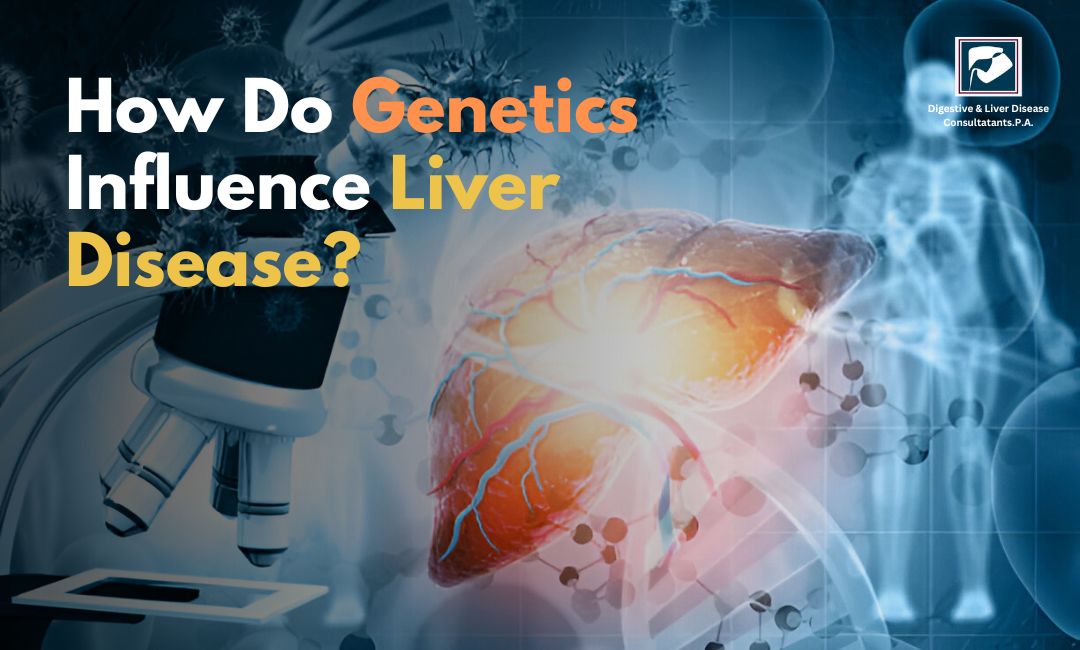The liver is one of the most vital organs in the human body, responsible for detoxifying harmful substances, aiding digestion, and regulating essential bodily functions. While lifestyle factors like diet, alcohol consumption, and infections play a major role in liver health, genetics can also significantly impact the likelihood of developing liver diseases.
At Digestive & Liver Disease Consultants, P.A., our specialists understand how genetic factors contribute to liver conditions and provide advanced diagnostic and treatment options to help patients manage their health effectively. In this blog, we explore the role of genetics in liver disease, common hereditary liver conditions, and how early detection can make a difference.
How Genetics Influences Liver Disease
Genetics plays a crucial role in many liver diseases, either by directly causing the condition or increasing a person’s susceptibility. Some genetic liver diseases result from inherited mutations, while others involve a combination of genetic predisposition and environmental factors.
Understanding the genetic component of liver disease can help in early diagnosis, targeted treatment, and preventive strategies for at-risk individuals.
Common Genetic Liver Diseases
1. Hemochromatosis (Iron Overload Disease)
Hereditary hemochromatosis is a genetic condition that causes the body to absorb too much iron from food. Excess iron gets stored in the liver, heart, and pancreas, leading to serious complications such as liver cirrhosis, liver cancer, diabetes, and heart disease.
Symptoms: Fatigue, joint pain, abdominal pain, skin discolouration, and liver enlargement.
Diagnosis & Treatment:
- Genetic testing can confirm mutations in the HFE gene, which is commonly associated with hemochromatosis.
- Blood tests help measure iron levels.
- Treatment includes regular blood removal (phlebotomy) to reduce iron overload.
2. Wilson’s Disease (Copper Buildup in the Liver)
Wilson’s disease is a rare genetic disorder where the body cannot properly eliminate excess copper. As a result, copper accumulates in the liver and other organs, leading to liver damage and neurological symptoms.
Symptoms: Jaundice, tremors, difficulty speaking, swelling, and confusion.
Diagnosis & Treatment:
- Genetic testing for ATP7B gene mutations helps confirm the disease.
- Blood and urine tests measure copper levels.
- Treatment includes lifelong medications like chelating agents (penicillamine or trientine) that help remove excess copper.
3. Alpha-1 Antitrypsin Deficiency (AATD)
Alpha-1 antitrypsin (AAT) is a protein that protects the lungs and liver from inflammation. AAT deficiency is a genetic disorder that can cause liver disease, lung disease, or both.
Symptoms: Liver scarring (fibrosis), cirrhosis, jaundice, shortness of breath, and lung infections.
Diagnosis & Treatment:
- Blood tests measure AAT levels.
- Genetic testing can identify mutations in the SERPINA1 gene.
- Treatment focuses on managing symptoms, avoiding liver toxins (like alcohol), and, in severe cases, a liver transplant.
4. Polycystic Liver Disease (PLD)
PLD is a genetic condition characterized by the development of multiple fluid-filled cysts in the liver. It is often associated with polycystic kidney disease (PKD).
Symptoms: Abdominal pain, bloating, liver enlargement, and in some cases, liver failure.
Diagnosis & Treatment:
- Imaging tests like ultrasound, CT, or MRI confirm the presence of cysts.
- Management includes symptom relief, cyst drainage, or surgical intervention in severe cases.
Genetic Predisposition to Other Liver Diseases
Even if a liver disease isn’t directly inherited, genetics can still play a role in increasing susceptibility. For example:
Non-Alcoholic Fatty Liver Disease (NAFLD): Some genetic variants, like those in the PNPLA3 gene, can increase the risk of developing NAFLD, especially when combined with obesity and diabetes.
Primary Biliary Cholangitis (PBC): This autoimmune liver disease has a genetic component, with close relatives of affected individuals having a higher risk.
Hepatitis-Induced Liver Damage: While hepatitis B and C are viral infections, some people are genetically more susceptible to severe liver damage due to differences in immune response.
The Importance of Genetic Testing and Early Detection
Since many genetic liver diseases are progressive, early diagnosis can significantly improve outcomes. Genetic testing helps identify individuals at risk before symptoms appear, allowing them to take preventive measures such as:
Lifestyle Changes: Avoiding alcohol, maintaining a healthy diet, and exercising can slow disease progression.
Regular Monitoring: Routine liver function tests, imaging, and blood tests can detect early signs of damage.
Targeted Treatments: Personalized therapies based on genetic profiles improve management and outcomes.
How Digestive & Liver Disease Consultants, P.A. Can Help
At Digestive & Liver Disease Consultants, P.A., we specialize in diagnosing and managing genetic liver diseases with state-of-the-art testing and expert care. Our services include:
- Comprehensive Genetic Testing to assess hereditary risks.
- Advanced Imaging and Diagnostics for early disease detection.
- Personalized Treatment Plans tailored to your specific needs.
- Ongoing Monitoring & Support to help you manage liver health effectively.
Conclusion
Genetics plays a crucial role in liver disease, influencing both inherited disorders and susceptibility to other conditions. While we cannot change our genetic makeup, early detection and proactive management can significantly improve outcomes.
If you have a family history of liver disease or experience symptoms like fatigue, jaundice, or abdominal pain, don’t wait—schedule an appointment with our best Gastroenterologists at Digestive & Liver Disease Consultants, P.A. today.






